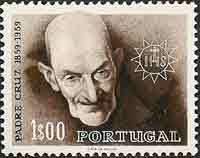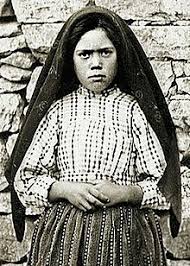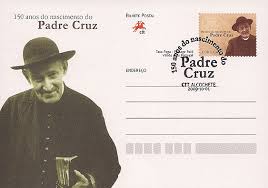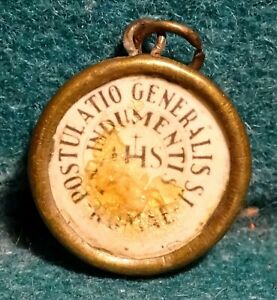Servant of God FRANCIS RODRIGUES da CRUZ, SJ
Born: July 29, 1859
Died: October 1, 1948
 Francis Rodrigues da Cruz, was born in Alcochete, near Lisbon, Portugal. He was the fourth of six children of a timber lumberer. When he was nine, he and his brother went to Lisbon to continue their studies at the Industrial Institute and then at the Lycee. He had thought of becoming a priest at the age of sixteen when he enrolled at the University of Coimbra. He completed his theology before twenty-one and since he was too young to be ordained, he taught philosophy at the seminary in Santarem. He was ordained on June 3, 1882 and continued with his teaching at Santarem until 1886 when he was forced to relinquish it because his health became so poor. He was sent to Braga to direct a school for orphans interested in entering the seminary. However he had to give this up too after eight years for health reasons.
Francis Rodrigues da Cruz, was born in Alcochete, near Lisbon, Portugal. He was the fourth of six children of a timber lumberer. When he was nine, he and his brother went to Lisbon to continue their studies at the Industrial Institute and then at the Lycee. He had thought of becoming a priest at the age of sixteen when he enrolled at the University of Coimbra. He completed his theology before twenty-one and since he was too young to be ordained, he taught philosophy at the seminary in Santarem. He was ordained on June 3, 1882 and continued with his teaching at Santarem until 1886 when he was forced to relinquish it because his health became so poor. He was sent to Braga to direct a school for orphans interested in entering the seminary. However he had to give this up too after eight years for health reasons.
Fr Cruz returned to Lisbon and was spiritual director of the students in the minor seminary. He gradually assumed more tasks as his health improved. When the minor seminary moved out of Lisbon, Fr Cruz remained in the capital for the next forty-three years working tirelessly in helping the poor, the sick and visiting those in prisons. His special joy was when he was asked to substitute for his fellow priests or to be just an extra pair of hands. He gave novenas frequently, preached the Forty Hours in neighbouring parishes and gave triduums in preparation for the Archbishop’s visits.
 Fr Cruz was in Vila Nova de Ourem in 1913 to preach at a First Communion Mass. He was the priest who persuaded the local pastor to permit Lucia dos Santos, one of the three children to whom Our Lady appeared at Fatima to receive Holy Communion after he had quizzed her and was certain that she knew her catechism exceptionally well and had a good understanding of the faith notwithstanding that she fell short of the age requirement. He was also the priest who told Lucia and her two cousins, Francisco and Jacinta four years later in June 1917 after talking to them: “Be assured, have no fear; it was not a devil who appeared to you but the Holy Virgin.” when he was asked by the parish priest to question them about the apparitions and to set them straight.
Fr Cruz was in Vila Nova de Ourem in 1913 to preach at a First Communion Mass. He was the priest who persuaded the local pastor to permit Lucia dos Santos, one of the three children to whom Our Lady appeared at Fatima to receive Holy Communion after he had quizzed her and was certain that she knew her catechism exceptionally well and had a good understanding of the faith notwithstanding that she fell short of the age requirement. He was also the priest who told Lucia and her two cousins, Francisco and Jacinta four years later in June 1917 after talking to them: “Be assured, have no fear; it was not a devil who appeared to you but the Holy Virgin.” when he was asked by the parish priest to question them about the apparitions and to set them straight.
Fr Cruz’s most important apostolate was in the confessional. He was the favourite with children and women, labourers and soldiers, businessman and government officials who formed long lines outside his box. They found him a holy, humble and kind confessor. Although the cardinal wanted to appoint him a canon in the cathedral chapter, Fr Cruz declined, saying that he was called by God to minister to the wretched and the afflicted and in this manner he could best give praise and glory to God. However, he was later appointed director of the Apostolic Union of diocesan priests whose purpose was to seek to deepen their spiritual life
Although Fr Cruz was always active among the diocesan clergy, he was at heart a Jesuit. He had since his university days been acquainted with the Society and had made an eight-day retreat under a Jesuit’s direction in 1880. He had thought of entering the Society but his health deterred him from taking on more years of study and the rigours of community life. He vowed to enter the Society when his health improved. When the Jesuits were expelled from Portugal in 1910, Fr Cruz wanted to go into exile with them but was persuaded by the Jesuit provincial to remain in Portugal to continue to do good for the Church. When the Jesuits returned from exile, he kept up with regular visits to them but as his health was still uncertain his dream of becoming a Jesuit could never be realized.
 In 1929, when Fr Cruz was already seventy years old, the Jesuit general, Fr Wlodzimierz Ledochowski obtained an indult from Pope Pius XI granting Fr Cruz permission to take Jesuit vows on his deathbed. From that day onwards, Fr Cruz carried a copy of the vow formula with him and as the years passed the aging priest became worried that he might miss the chance to pronounce the vow in the event of a sudden death. In 1940, the Holy Father granted an indult authorizing the eighty-one-year-old priest to take vows as a Jesuit without making noviceship and allowed him to live with friends who had been caring for him. Fr Cruz’s long last desire was fulfilled when he finally chose December 3, 1940, as his vow day as it was the feast of his patron, St Francis Xavier.
In 1929, when Fr Cruz was already seventy years old, the Jesuit general, Fr Wlodzimierz Ledochowski obtained an indult from Pope Pius XI granting Fr Cruz permission to take Jesuit vows on his deathbed. From that day onwards, Fr Cruz carried a copy of the vow formula with him and as the years passed the aging priest became worried that he might miss the chance to pronounce the vow in the event of a sudden death. In 1940, the Holy Father granted an indult authorizing the eighty-one-year-old priest to take vows as a Jesuit without making noviceship and allowed him to live with friends who had been caring for him. Fr Cruz’s long last desire was fulfilled when he finally chose December 3, 1940, as his vow day as it was the feast of his patron, St Francis Xavier.
Fr Cruz continued his apostolate of hearing confessions and counseling the clergy but he was now under obedience to a Jesuit superior. In Dec 1947, he had to give up celebrating Mass because of his health but he attended Mass daily. On Sep 30, 1948 he visited his superior to discuss plans for his annual retreat and before leaving the residence he requested to go to confession. The next morning, October 1, he received Communion in his room but after thanksgiving he collapsed and within a few minutes the eighty-nine-year-old Fr Cruz gave his soul to his Saviour.
 Fr Cruz was given a funeral as a patriarch in the Lisbon cathedral which was filled with his friends: priests, diocesan and Jesuits, nuns whom he directed, penitents whom he counseled and the poor whom he had assisted. They were all there to thank him for his Christ-like love and kindness. Cardinal Emanuele Goncalves Cerejeira, Patriarch of Lisbon in his sermon said: “The holy Fr Cruz will remain one of the purest glories of our patriarchate. The clergy of Lisbon will always venerate him as a striking example of an apostolate worker, of a priest totally consecrated to the glory of God and the salvation of souls. In him they will find a model and an advocate.”
Fr Cruz was given a funeral as a patriarch in the Lisbon cathedral which was filled with his friends: priests, diocesan and Jesuits, nuns whom he directed, penitents whom he counseled and the poor whom he had assisted. They were all there to thank him for his Christ-like love and kindness. Cardinal Emanuele Goncalves Cerejeira, Patriarch of Lisbon in his sermon said: “The holy Fr Cruz will remain one of the purest glories of our patriarchate. The clergy of Lisbon will always venerate him as a striking example of an apostolate worker, of a priest totally consecrated to the glory of God and the salvation of souls. In him they will find a model and an advocate.”
The cardinal began the diocesan investigation into Fr Cruz’s life and holiness within three years after his death and his cause is being studied presently.
